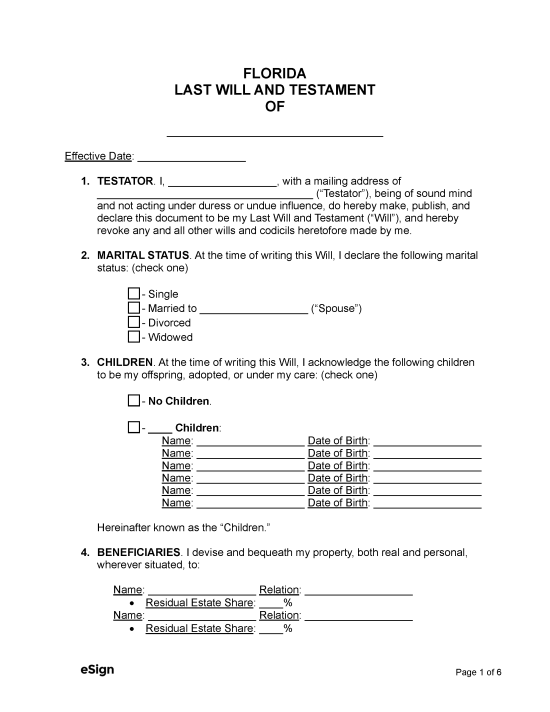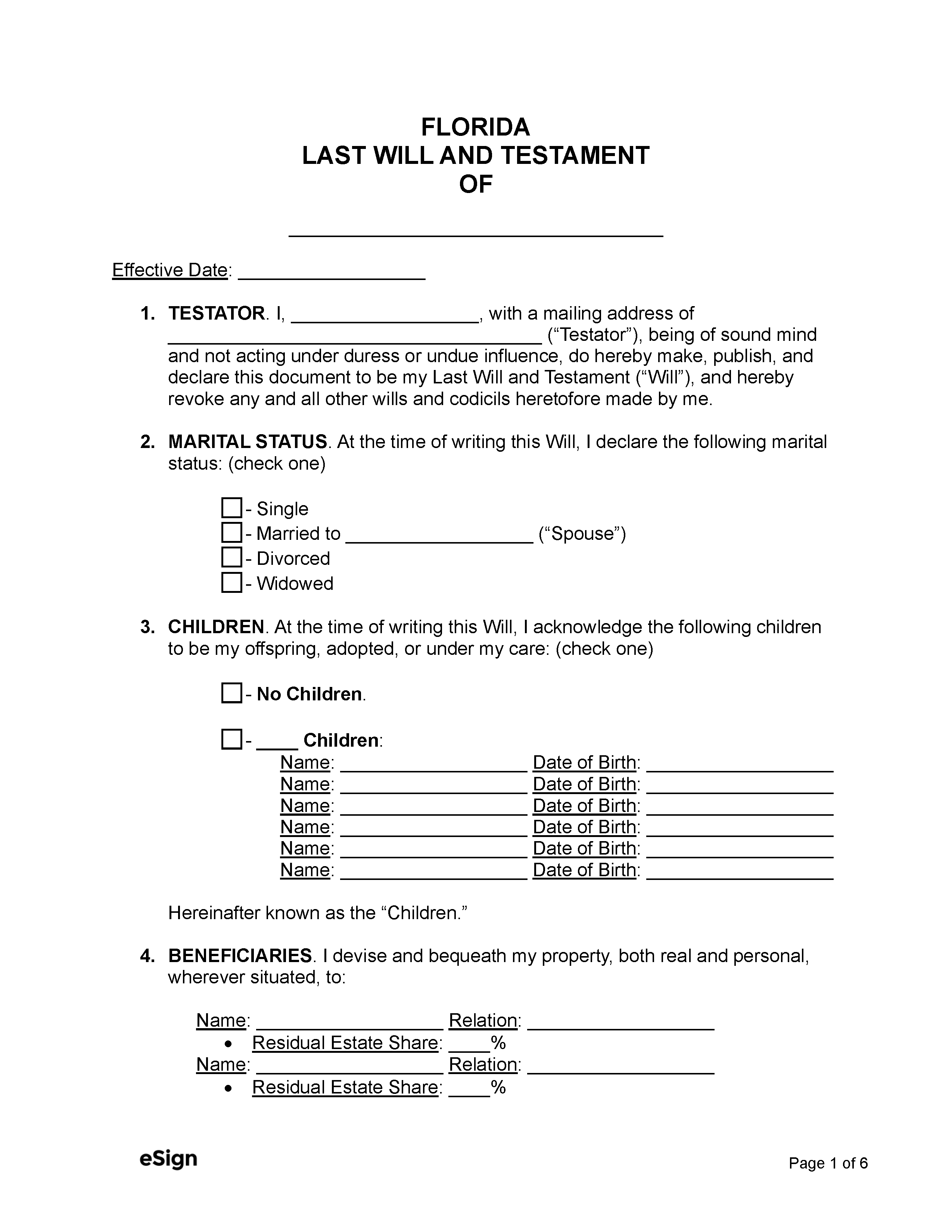State Laws
To make a will in Florida, a person must be of sound mind and either 18 years old or an emancipated minor.[1]
Holographic Wills – All wills in Florida must meet statutory requirements; therefore, unwitnessed, holographic wills are not considered valid.[2]
Revocation – The testator can revoke their will by executing a subsequent will, canceling it in writing, or by destroying the document.[3]
Signing Requirements – To be valid, a will must be executed by the testator with two witnesses present, who must also sign.
Probate Process in Florida (6 steps)
Within 10 days of learning of a person’s death, the custodian of their will must file the original copy with the circuit court for the county where the decedent resided.[4] The decedent’s death date or the last four digits of their SSN must also be provided.
- Beginning Probate
- Bond & Resident Agent (If Applicable)
- Letters of Administration
- Notices
- Collecting & Inventory Assets
- Distribution & Discharge
1. Beginning Probate
If the decedent’s estate, excluding any exempt property or homestead, doesn’t exceed the cost of the funeral and medical expenses for the final 60 days, probate can be avoided by filing a Disposition of Personal Property without Administration form with the circuit court.[5]
If the estate doesn’t exceed $75,000, discluding exemptions, or if the decedent has been deceased for two or more years, a beneficiary can file a Petition for Summary Administration (SAMPLE), which allows for a more efficient probate process.[6]
To begin the formal administration process (the most common), any person with an interest in the decedent’s estate can file a Petition for Formal Administration with the circuit court with jurisdiction over the decedent’s last residence.[7] In most cases, the personal representative named in the will files the petition.
Unless the personal representative is the only person with an interest in the estate or a Florida-licensed attorney, they are required to hire a Florida attorney for formal administration.[8]
Death Certificate
The decedent’s death certificate must also be filed with the circuit court. However, the petitioner has three months after publishing the Notice to Creditors to file it.
2. Bond & Resident Agent (If Applicable)
The personal representative must post a bond for the estate unless the will or the court waives the requirement.[9] The amount of the bond will be determined by the court to protect the beneficiaries and creditors against any possible loss resulting from the personal representative’s administration of the estate.[10]
Resident Agent Address
If the personal representative isn’t a corporate fiduciary or Florida Bar member with an office in Florida, they must designate a resident agent to receive notices from the court. The resident agent must be appointed before Letters of Administration can be given.[11]
3. Letters of Administration
4. Notices
Notice of Administration
After receiving Letters of Administration, the personal representative must deliver Notice of Administration to the decedent’s beneficiaries and legal heirs. If the recipients wish to object to the will, venue, or court jurisdiction, they must do so within three months.[12]
Notice to Creditors
The personal representative is required to serve a Notice to Creditors to all the decedent’s known creditors. The Notice to Creditors must also be published for two consecutive weeks in a local newspaper to notify any unknown creditors.[13] If a creditor was served the notice, they have 30 days to file their claim against the estate. If a creditor was notified by publication, they have three months.[14] Within 30 days of receiving a claim, the personal representative must respond by paying the debt or objecting.
The personal representative is required to file proof of publication for the Notice to Creditors with the circuit court within 45 days of the first publication date. Four months after the date of the first publication, the personal representative must also file a verified statement with the circuit court stating that all creditors have been notified and valid debts paid.
5. Collecting & Inventorying Estate Assets
To administer the estate, the personal representative will need to collect and inventory the decedent’s assets and property. Once completed, the Estate Inventory (SAMPLE) must be filed with the circuit court and served on the decedent’s spouse and beneficiaries within 60 days of receiving Letters of Administration.[15]
After this has been accomplished, the personal representative can use estate funds to pay the decedent’s debts, unpaid taxes, and the administration costs. The personal representative can sell the decedent’s property to raise more money if necessary.[16]
Determination of Homestead
Under Florida law, the decedent’s homestead (main residence) is protected from creditors and can usually pass directly to the heirs.[17] However, to ensure that the property is protected, the court must enter a Determination of Homestead to confirm its status.
6. Distribution & Discharge
When all valid claims against the estate are resolved and debts paid, the personal representative must complete and file a Final Accounting (SAMPLE) of the estate’s administration with receipts for all transactions and a Petition for Discharge with the circuit court. The personal representative will need to serve copies of both documents on the beneficiaries. The petition includes the proposed final distribution of the decedent’s remaining assets.[18]
After filing, the rest of the estate may be distributed to the beneficiaries following the planned distribution. Unless estate tax is owed, the Final Accounting and Petition for Discharge must be filed and served within 12 months of the issuance of Letters of Administration.
Any interested party can file an objection to the Final Accounting within 30 days of being served a copy of the document. Unless all interested parties waive the requirement and there are no objections, the court will hold a formal hearing to review the Final Accounting.
If everything is in order, the judge will issue an Order of Discharge (SAMPLE) to relieve the personal representative of their duties.[19]

